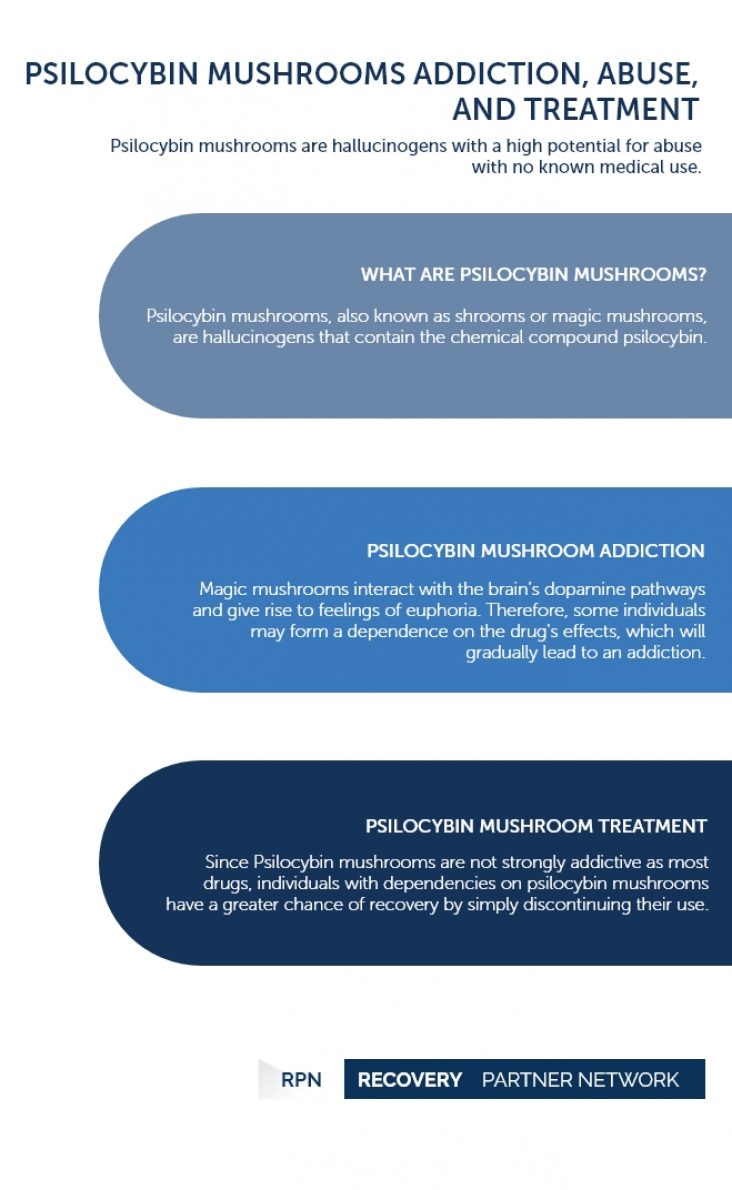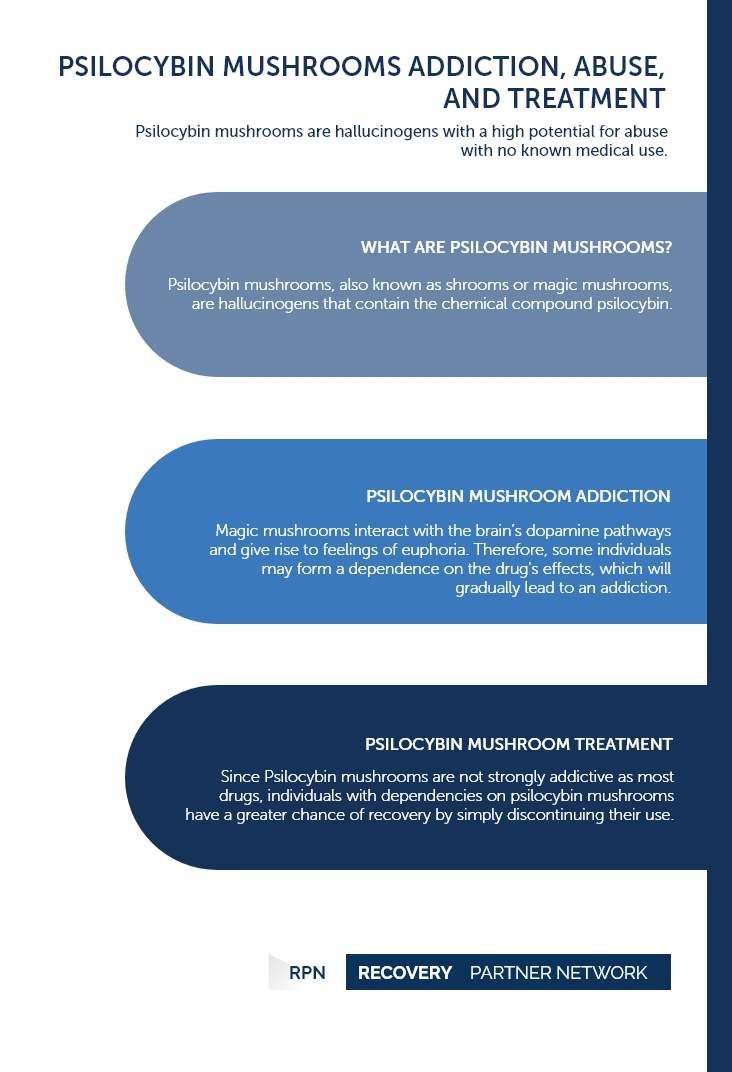Psilocybin mushrooms are hallucinogens with a high potential for abuse with no known medical use.
Psilocybin Mushrooms Addiction, Abuse, and Treatment
Illicit drugs
- Ayahuasca addiction – Abuse
- Baclofen addiction
- Black tar heroin addiction
- Cannabis addiction
- Cocaine dependence
- Crack cocaine addiction
- DMT addiction abuse treatment
- Does Marijuana Kill Brain Cells?
- Ecstasy addiction
- Gabapentin addiction
- gamma-Hydroxybutyric acid addiction
- Hallucinogen
- Heroin addiction
- Illicit drug addiction
- Inhalant addiction
- Cocaine
- Ketamine addiction
- Lysergic acid diethylamide addiction
- Mescaline addiction
- Methamphetamine addiction
- Meth Labs: Cooking up Addiction
- Meth Mouth
- Microdosing
- Phencyclidine addiction
- Psilocybin mushroom addiction
- Sage of the diviners – Addiction
- Shooting Heroin
- Shooting Methamphetamine
- Smoking Cannabis
- Speedball
- Synthetic cannabinoids
Psilocybin mushroom addiction | Table of Contents
What Are Psilocybin Mushrooms?
Psilocybin mushrooms, also known as shrooms or magic mushrooms, are hallucinogens that contain the chemical compound psilocybin. Magic mushrooms are widely known for their psychedelic effects that generate mind-altering experiences in a user. Traditionally used throughout indigenous communities to connect with the spirit world, magic mushrooms gained mass popularity during the hippie movement in the 1960s. Although they are frequently abused at music festivals in current times, magic mushrooms have been Illegal since the 1970s and are classed as a Schedule I drug under the Controlled Substance Act.
Most magic mushrooms have a psilocybin content of 0.2 to 0.4 percent. They are also comprised of a small amount of psilocin (psilocybin metabolite). Nevertheless, when an individual consumes psychedelic mushrooms, the body naturally converts the psilocybin into psilocin. According to a 2017 study published in the Drug Metabolism Reviews, psilocin is the chemical responsible for the psychoactive effects of magic mushrooms.
Magic mushrooms are usually eaten fresh, brewed in tea, or baked in cakes. Psilocybin mushrooms could also be dried and squashed into a powder that can be injected, sniffed, or put into capsules and swallowed.
The effects of this psychedelic mushrooms are generally felt within 20 minutes to 2 hours after ingestion; the effects usually last 3 to 6 hours and may include anxiety, restlessness, chills, and euphoria. In certain instances, the effects of the mushrooms may last up to three days. The feelings of relaxation and changes in perception caused by magic mushrooms can tempt people to misuse them often.
FAQ
Psilocybin mushrooms, also known as magic mushrooms, are a type of fungi that contain psilocybin and psilocin compounds. These compounds can trigger hallucinogenic effects.
Boomers, caps, hombrecitos, Las mujercitas, little smoke, magic mushrooms, musk, mushies, shrooms, silly putty, and simple Simon are some of its street names.
Common Side Effects of Psilocybin Mushrooms
Psilocybin mushroom abuse is generally not as life-threatening compared to many other substances of abuse, such as opioids or stimulants. However, some users have experienced mushroom poisoning.
Some of the side effects of psilocybin mushrooms include:
- Nausea
- Dry mouth
- Increased heart rate
- Chills
- Numbness
- Inattention
- Feelings of floating
- Visual and auditory hallucinations
- Anxiety
- Lowered to no inhibitions
- Insomnia
- Psychosis
- Synesthesia (mixing up senses)
- Paranoia
- Muscle spasms
- Elevated, euphoric mood
- Sense of inflated well-being
- Enhanced perception of reality
- Elevated blood pressure
- Excessive sweating
In extreme cases of hallucination, individuals have experienced physical pain or caused harm to those around them. Research conducted by The Johns Hopkins University School of Medicine points out that even one strong dose of psilocybin mushroom can change a person’s personality for over a year, or sometimes permanently.
The long-term effects of magic mushrooms are yet to be studied. In controlled settings, studies have also indicated that psilocybin can generate positive psychological effects, without causing physical addiction or any long-lasting physical symptoms. However, the lack of studies does not equate to it being labeled as safe for consumption. The effects of psychedelic mushrooms can vary in real-world conditions. According to a 2005 case study in the journal European Psychiatry, there was a recorded case of magic mushrooms triggering HPPD when a person mixed the drug with marijuana.
Psilocybin Mushroom Addiction
There is massive controversy on whether or not magic mushrooms are addictive. However, since magic mushrooms interact with the brain’s mesolimbic dopamine pathways (responsible for regulating mood and feelings of happiness and satisfaction), some individuals may form a dependence on the drug’s effects.
As with any substance that generates euphoric effects, individuals are highly likely to form a dependence on them. The more they consume, the more they crave. In certain cases, individuals may prefer combining psilocybin mushrooms with other substances, such as LSD, to enhance their effects. As most who abuse hallucinogenic drugs are suffering from psychological issues and depend on the drug to feel good or normal, these individuals are highly likely to form a psychological dependence on them.
Magic mushrooms contain a capacity to form rapid tolerance within a short period. This would require users to consume more and more of the substance to achieve the desired effects. Some individuals may also form cross-tolerance with other psychedelics such as LSD, mescaline, or DMT.
Some of the signs of dependence on magic mushrooms are:
- Increasing the frequency of psilocybin mushroom use.
- Isolating from family and friends to use mushrooms.
- Combining the mushrooms with other drugs.
- Showing an increased tolerance to the substance.
FAQ
- Are mushrooms addictive?
- Can you overdose from psilocybin mushrooms?
- How do people use psilocybin mushrooms?
- Can psilocybin mushrooms be therapeutic?
Hallucinogens are often not considered addictive as they do not lead to compulsive use or disruptive behavior like other drugs.
It is a possibility to overdose on psilocybin mushrooms. However, it is not likely to cause death.
These mushrooms are often eaten raw or boiled, and the water is consumed as a tea. Some users may mix them into food to hide their taste. They are also available in powdered form, capsules, tablets, and solutions.
Research points out that monitored and controlled use of mushrooms can be therapeutic for many psychiatric illnesses. It can also be used to unleash creativity and for personal and spiritual development.
Magic Mushroom Statistics
According to a Johns Hopkins study, volunteers in an experiment rated a psilocybin session as one of the topmost spiritual experiences of their lives.
- Under high doses, around one-third of those interviewed experienced great fear, anxiety, or delusions. However, the researchers stated that those reactions were controlled with gentle encouragement from the study monitors and did not harm the volunteers or outlast the session.
- The active compounds in magic mushrooms have LSD-like properties and generate changes in autonomic function, motor reflexes, behavioral patterns, and perception.
- In another study, volunteers were provided preparatory guidance and five monthly sessions, four with different concentrations of psilocybin and one with a placebo. Although the positive effects of psilocybin continued to increase with increasing doses, the likelihood of fear or delusion increased dramatically at the highest doses. When the second-highest dose was given, two-thirds of the volunteers rated the experience as one of the five most spiritually significant experiences.
- As per the National Survey on Drug Use and Health (NSDUH), in 2007, there were nearly 1.1 million people aged 12 years and older who reported taking hallucinogens for the first time within the past 12 months.
Psilocybin Mushroom Withdrawal
Due to the habit-forming nature of magic mushrooms, users can undergo psilocybin mushroom withdrawal upon discontinuing the drug use. Individuals abusing psilocybin mushrooms will not only become accustomed to the altered state of mind generated by the drug but will also find it difficult to live in the “real world.” They may suffer memory loss and continue to indulge in psilocybin mushrooms to preserve their altered state. Some users suffer from flashbacks, fatigue, and irritability from the hallucinogenic drug. Users going through withdrawal may also experience confusion and difficulty in determining reality.
Psilocybin Mushroom Treatment
Treatment for psilocybin mushroom abuse is required if an individual forms a psychological dependence on the drug and finds it hard to function without it. One of the most effective ways of breaking the cycle of dependency is to stop consuming it. Since they are not as strongly addictive as most other drugs, individuals with dependencies on psilocybin mushrooms have a greater chance of recovery.
When someone has combined psilocybin mushrooms with other substances such as alcohol, benzodiazepines, stimulants, or opioids, detox is required. Detox would help the patient with multiple substance use disorders to wean off the substances before the condition gets worse. Detox will require medically assisted treatment to gradually cleanse the system of harmful substances.
Recovery Partner Network
We aim to educate and empower. If you feel our library of resources does not cover your specific need, reach out to us, and we would be happy to help.
STATISTICS
© Copyright 2026


